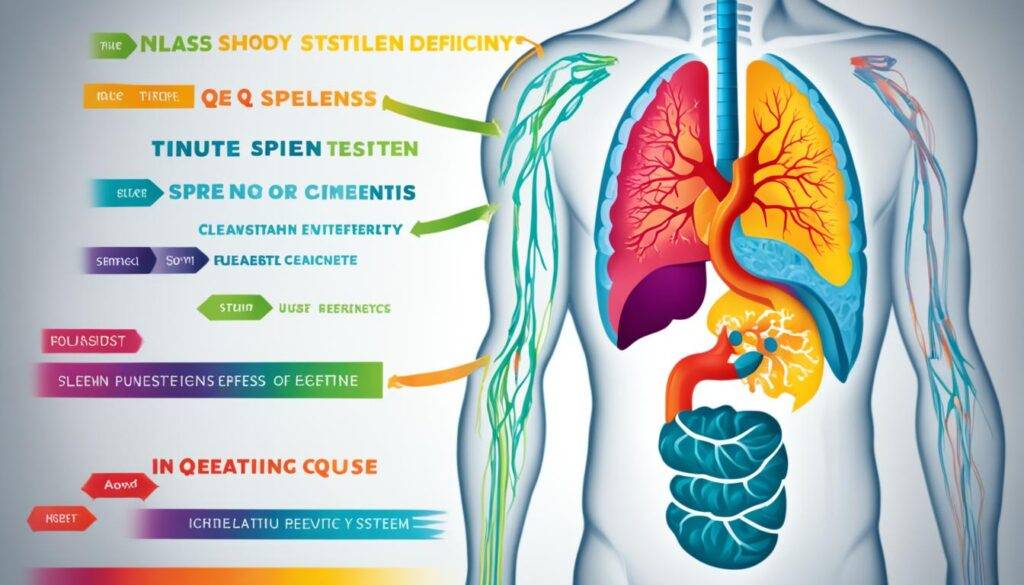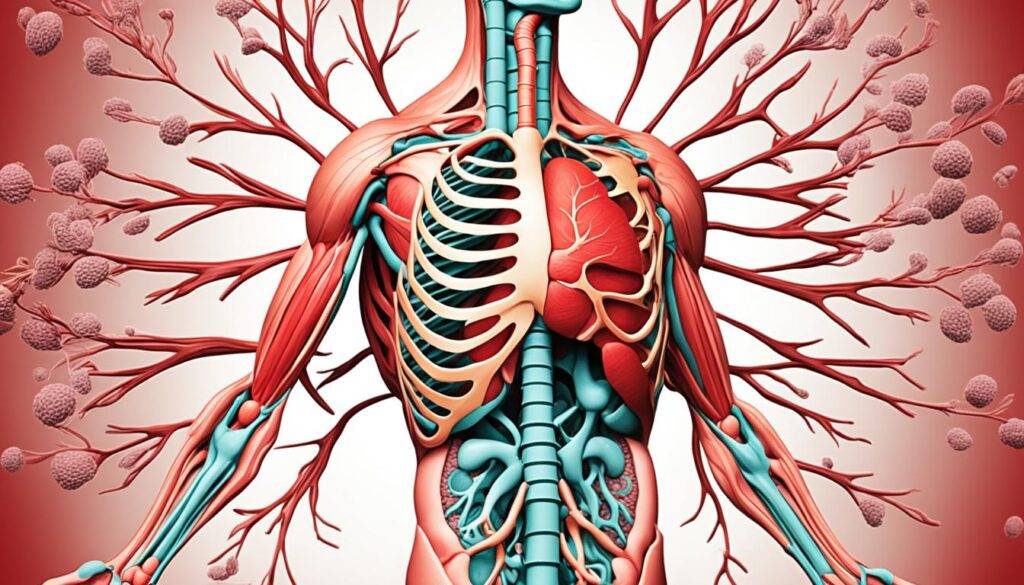Feeling tired a lot, having tummy troubles, or moods that swing a bit too much? These signs often point to a balance issue in Traditional Chinese Medicine (TCM). It’s called Spleen Qi deficiency. In this piece, we deep dive into the world of Spleen Qi, its signs, the reasons behind it, and how to get back in harmony.
TCM sees qi as the vital force flowing in our bodies all the time. When it gets low, the spleen is often the culprit.1 Though TCM isn’t exactly like modern medicine, many find it useful to grasp health holistically. We’ll talk about what a qi shortage means, its symptoms and causes, and how adjusting our rest and diet can help.
Key Takeaways:
- Spleen Qi deficiency is a common issue in TCM with many possible symptoms.
- It can be caused by things like eating irregularly, too much stress, ongoing illnesses, or spleen function problems.
- Diet changes, herbs, stress relief methods, and mixing TCM with Western ideas are key parts of treatment.
- Fixing Spleen Qi can boost your health, energy, and zest for life.
- Getting help from a skilled TCM expert is vital if you’re dealing with this issue.
Understanding Qi in Traditional Chinese Medicine
In Traditional Chinese Medicine (TCM), qi means life force or energy. It’s in everything, from our bodies to our emotions. Practitioners of TCM say having balanced qi is key to a healthy life. If your qi is out of balance, it could lead to health issues. The National Center for Complementary and Integrative Health (NCCIH) sees qi as a kind of body energy that keeps us well. They’re interested in TCM but from a science stance, not focusing on qi directly. Their work looks at how TCM treatments can help manage symptoms.
The Concept of Qi as Life Force
Translated, qi is energy. So when you have a qi deficiency, it means your energy is low. This can show up in the whole body or affect specific organs, causing different issues. For example, a general Qi deficiency might make you feel tired all the time or generally unwell. A study in 2015 gave these signs of a qi deficiency: tiredness, not wanting to talk, sweating, a puffy tongue, and a weak pulse. The study also connected aging with potentially causing this energy shortage.1
Qi Deficiency and Its Impact on Health
Some say qi deficiency could be linked to serious health issues like heart disease and high blood pressure.1 Using up too much energy by overworking is another known cause. In the fast-paced lives of many, especially in the West, constant stress and little rest can deplete vital energy. This makes someone more likely to have a qi deficiency and related health problems.1
While there isn’t a lot of solid scientific evidence on qi and qi deficiency, some people report feeling better by changing their diet or lifestyle to support qi balance. They might also find relief with therapies like acupuncture. These methods surprisingly work for many, despite the lack of scientific backing.
Spleen Qi Deficiency: A Common TCM Imbalance

Traditional Chinese Medicine (TCM) looks at the whole body. It doesn’t just treat symptoms like Western medicine might with coffee for tiredness. It aims to solve the root causes of issues, such as fatigue. This approach is part of how TCM views Spleen Qi deficiency, a common problem.
An imbalance such as Spleen Qi Deficiency can result from overworking, bad eating habits, and emotional stress.
There is limited scientific proof for terms like ‘qi’ and ‘qi deficiency’. Yet, changing diet and lifestyle can help balance qi and relieve symptoms. Also, treatments like acupuncture might aid in this balance.
| Spleen-Qi Deficiency | Spleen-Yang Deficiency | Spleen-Yin Deficiency |
|---|---|---|
| Fatigue, asthenia, atrophied muscle, pale tongue with thin white coating, and a moderate, weak pulse2 | Cold limbs, fear of cold, puffy pale tongue with slippery coating, and a slow, fine pulse2 | Dry mouth, low urine output, dry stool, shrunken smooth bare, red tongue, and a rapid fine pulse2 |
Diagnosis often includes not wanting to eat, feeling full after eating, and having loose stools or a pale face. These symptoms are related to changes in how the stomach works, seen in patients with stomach problems.2
In a study, Spleen deficiency led to lower serum gastrin levels. But these levels improved with treatment. Peptic ulcer patients with Spleen deficiency had higher stomach acid than usual people, which also improved after treatment. Furthermore, chronic gastritis patients with Spleen deficiency had lower activity in their stomach lining, but it got better with treatment.
Past research noticed changes in the stomach lining and nervous system in people with Spleen deficiency syndrome. They found significant shifts in saliva, stomach activity, and more. All these changes improved with treatment for the Spleen issue.2
Symptoms of Spleen Qi Deficiency
In TCM, qi comes from the spleen and spreads across the body.3 If the spleen is weak, it affects the whole body. You can eat certain foods to help the spleen work better. Signs of spleen qi deficiency are not wanting to eat, feeling full quickly, and having a pale face.3
Digestive Issues
A weak spleen might mean you don’t feel like eating and your stomach feels full and bloats easily.3 It could also lead to loose, watery stool. In people with a weak stomach, their body might not absorb certain things the right way.2 This can make the cells that cover the inside of our stomachs die too quickly.2 Also, some substances linked to how our bowels work were higher in these patients, which could cause more loose stools.2
Fatigue and Weakness
Having a spleen qi deficiency might make you feel tired a lot, with weak muscles and low energy.3 It can also lower the amount of saliva your mouth makes.2 This makes it hard for your stomach to work well, which makes your body even more tired.2
Emotional Imbalances
A weak spleen might not just affect your body but also your feelings. You might feel sad, worried, or just not happy.3 Patients with a stomach problem related to a weak spleen had lower levels of certain protective substances in their bodies.2 But their body had more of a substance linked to how the heart beats and blood pressure, which could lower these numbers too.2
Causes of Spleen Qi Deficiency

Spleen Qi Deficiency starts with too much work, bad food, or stress.3 Eating at irregular times or having too many cold foods weakens it too.3
Irregular Eating Habits
Not sticking to a regular eating schedule or diet hurts the Spleen.3 Eating too many cold or raw things, skipping meals, or eating in excess does this too.3 This messes with the Spleen’s job of turning food into energy.
Excessive Stress and Emotional Strain
Too much worry or anxiety hurts the Spleen Qi, causing mental strain.3 Constantly focusing on negative emotions can mess up the Spleen’s work, causing a Qi deficiency.
Chronic Illnesses and Imbalances
Dampness and excessive daily stress can lead to Spleen Qi Deficiency.3 Using up too much energy over time, along with chronic illnesses, can make this problem worse.3 This puts a strain on the Spleen, using up its energy.
The Role of the Spleen in Traditional Chinese Medicine

In Traditional Chinese Medicine (TCM), the Spleen is talked about differently than in the West. Here, the Spleen means more than just the physical spleen organ.4 It involves things like digestion, energy, and the power of Qi. This includes how we process food and its impact on our body’s energy. The Spleen and the Stomach are partners in digestion, taking care of changes in food. They turn what we eat into what TCM calls Qi or life energy.
Digestive Functions
The Spleen is key for breaking down food and turning it into energy and blood.2 In TCM, the Spleen and Stomach work together, both linked to the Earth element, summer, and the color yellow. In Chinese Medicine, there’s a body clock that shows the best times for these organs to do their job: 7 am to 11 am. During these hours, they absorb nutrients and start sending them through the body.
Qi Production and Distribution
The Spleen plays a vital part in turning food into the fuel our body needs.2 In TCM, it’s closely connected to the Stomach, the Earth element, summer, and yellow. The work of these organs is most active between 7 am and 11 am. This is when they help our body absorb nutrients and send them to where they’re needed.
Dietary Recommendations for Spleen Qi Deficiency

Warming and Nourishing Foods
If you have Spleen Qi deficiency, changing your diet is key. You should eat warm and nourishing foods all day long.3 These include things like roasted root veggies, rice, and chicken. Also, adding slightly sweet foods can help balance Spleen Qi.3
Avoiding Cold and Raw Foods
Try not to eat too much or too little, as this can harm your Spleen.5 Also, avoid foods that are cold and raw. They may make your digestion weaker. Your Spleen loves warmth, and eating foods that warm you up is good for it.5
Incorporating Spleen-Nourishing Herbs
Herbs can also be very helpful for your digestive system. Some good ones include ashwagandha and astragalus.3 These are known to even out your immune system.3
Lifestyle Adjustments for Spleen Qi Balance
Finding ways to manage stress and stay mindful is key to better gut health.1 Tai Chi, Qi Gong, and easy yoga are good for moving gently, breathing deeply, and relaxing mindfully. These things boost the energy in your Spleen.1 They lower stress, help with digestion, and connect your mind and body well, which the Spleen loves.
Stress Management Techniques
To keep your Spleen Qi strong and improve how you feel overall, add Tai Chi, Qi Gong, and light yoga to your life. Doing these exercises often means moving easily, breathing deeply, and calming your mind. This perks up your Spleen’s energy.1 You’ll stress less, digest better, and feel your body and mind work closely together, which the Spleen enjoys.
Gentle Exercises like Tai Chi and Qigong
Activities like Tai Chi, Qi Gong, and relaxing yoga are great for light movement, deep breaths, and peaceful thoughts. These support your Spleen energetically.1 They lower your stress, boost digestion, and make sure your body and mind are in sync, which keeps your Spleen happy.
Integrating Western Medicine and TCM
Addressing spleen qi deficiency is a key area where Western medicine and Traditional Chinese Medicine (TCM) can work together. A TCM practitioner will start by learning about your health and checking you over. They do this to spot any imbalances.6In TCM, looking at the tongue is very important. It’s seen as a clue to your health’s balance. After your TCM practitioner finds the issue, they will lay out a treatment plan. It’s wise to also get some
blood work
done. This can help rule out problems that might need only
Western medicine
or its help.
Seeking Professional Guidance
There isn’t a lot of hard proof that fixing qi deficiency helps, but many folks feel better after tweaking their diet, and lifestyle, and trying things like acupuncture.7 Talking to your doctor about what standard medicine can do and what research says can be a good idea. This discussion can help you find ways to mix Western and Eastern practices.
Combining Conventional and Complementary Approaches
7 TCM healing is based on looking at the patient’s unique situation (Zheng). This is different from Western medicine’s approach which often looks at treating groups with the same medicine. By teaming up with both your TCM practitioner and your regular doctor, you can aim for the best of both worlds.
Spleen Qi Deficiency: Symptoms, Causes, and Treatment
Spleen qi deficiency is a common issue in Traditional Chinese Medicine (TCM). It can lead to problems like digestive issues and tiredness. A 2015 study found five key signs of qi deficiency: feeling tired, having no energy to talk, sweating easily, noticing a big tongue with teeth marks, and having a weak pulse.1 TCM experts think that conditions like heart disease may also be linked to qi deficiency.1 Those with busy lives and stress are more likely to face qi deficiency. This is because stress can drain the body’s energy.1
1 TCM takes a holistic view to treat conditions like fatigue. Instead of using stimulants, it aims to balance the body’s energy. Although modern science doesn’t fully support TCM ideas, many have found relief with diet changes and acupuncture.1 A study in Experimental Neurobiology even shows that less stress can help you sleep better and feel more energetic.1
1 TCM connects spleen health to qi deficiency. A good diet for the spleen can help you balance your energy. Recommended foods include lentils, quinoa, and root vegetables. You should avoid eating things like refined sugar and fried foods.1
3 Spleen qi deficiency is often diagnosed in TCM. It can be its problem or part of a bigger issue. The Spleen and Stomach Systems in TCM are linked to the Earth element, the color yellow, and the taste of sweetness.3 Overworking, bad eating habits, and emotional stress can cause spleen qi deficiency.3
3 Signs of spleen qi deficiency may include not wanting to eat, feeling full quickly, and being tired all the time. It can be caused by your natural body makeup, bad diet, stress, and not enough rest. Eating warm, nourishing foods is recommended to help your spleen.3
3 Good foods for the spleen include rice, cooked vegetables, and lean meats. Supportive herbs are Codonopsis and Astragalus. Practices like Tai Chi and acupressure can strengthen the spleen.3 It’s always good to check with a healthcare provider before trying new methods.
8 A deficiency in qi can lead to different symptoms depending on what’s affected. It’s thought to underlie many health issues in the West. Stress and not sleeping well are big reasons why your energy could be low.8
8 Other causes of low qi include allergies, Lyme disease, and emotional problems. To treat qi deficiency, one might use specific foods, and herbs, and change their lifestyle to be more balanced.8 In TCM, the condition of your tongue is often checked to figure out if you have qi deficiency.8
8 Some believe TCM can help with many issues, from not being able to have kids to stomach problems. If you think you have low qi, it’s worth considering TCM. But, it’s also smart to see a Western doctor to check for serious diseases.8
Conclusion
Spleen Qi deficiency is a common issue in Traditional Chinese Medicine. It affects how our bodies handle energy. Understanding its symptoms and causes helps us address it. By making changes in what we eat, using herbs, and adjusting our lifestyles, we can heal.9 Experts in TCM are vital for managing this issue.10
Knowing about Spleen Qi deficiency helps me care for my health. I follow a diet that supports my Spleen. I also use herbs and practices advised by TCM experts. This way, I can improve my health and energy levels.210
The path to overcome Spleen Qi deficiency is unique for each of us. It combines TCM wisdom with modern science. This holistic approach is the key. It helps us heal, boosts our energy, and makes us feel better.910
FAQ
What is Qi deficiency according to Traditional Chinese Medicine (TCM)?
In TCM, qi is the body’s vital energy. A lack of this energy leads to a qi deficiency. This can affect the whole body or specific organs. It shows up in different symptoms.
What are the common signs and symptoms of a qi deficiency?
A 2015 study outlined five main signs of qi deficiency. They include feeling tired, not wanting to talk, and sweating easily. Also, having a swollen tongue with teeth marks and a weak pulse are signs.
What is the relationship between the spleen and qi deficiency in TCM?
In TCM, a qi deficiency often ties back to the spleen. The spleen spreads qi around the body. If it’s not working well, issues like poor appetite and bloating can appear.
What are the potential causes of spleen qi deficiency?
Spleen qi deficiency can come from not eating regularly and too much worry. Also, long-term health problems can make the spleen weak. This leads to its poor function.
How can spleen qi deficiency affect the body and emotions?
It can cause stomach problems, fatigue, and weak muscles. Emotional ups and downs, like feeling sad and anxious, can also occur. Worry might become a constant presence in your mind.
What dietary and lifestyle recommendations are suggested for supporting spleen qi?
TCM suggests eating warm, comforting foods. These include cooked veggies, lean meats, and whole grains. Avoiding cold, raw items is also important. Herbs and activities like Tai Chi can assist in balancing spleen qi.
How can Western medicine and Traditional Chinese Medicine (TCM) be integrated to address spleen qi deficiency?
Working with a combined approach, along with a skilled practitioner, is key. They may suggest a mix of western and TCM treatments. This can include advice on food, herbs, and practices like acupuncture. Getting blood tests is useful to understand the full picture.
Source Links
- https://www.medicalnewstoday.com/articles/321841
- https://www.ncbi.nlm.nih.gov/pmc/articles/PMC4767755/
- https://www.wildearthacupuncture.com/blog/2021/12/14/spleen-qi-defiency-what-is-it-and-how-to-deal-with-it
- https://www.euyansang.com.sg/en/tcm:-understanding-the-role-of-the-spleen/eystcmorgans5.html
- https://breakfastcure.com/the-best-spleen-qi-deficiency-diet/
- https://www.ncbi.nlm.nih.gov/pmc/articles/PMC3745867/
- https://www.ncbi.nlm.nih.gov/pmc/articles/PMC2659569/
- https://www.healthline.com/health/qi-deficiency
- https://www.ncbi.nlm.nih.gov/pmc/articles/PMC7474375/
- https://www.sciencedirect.com/science/article/abs/pii/S0378874119350949

